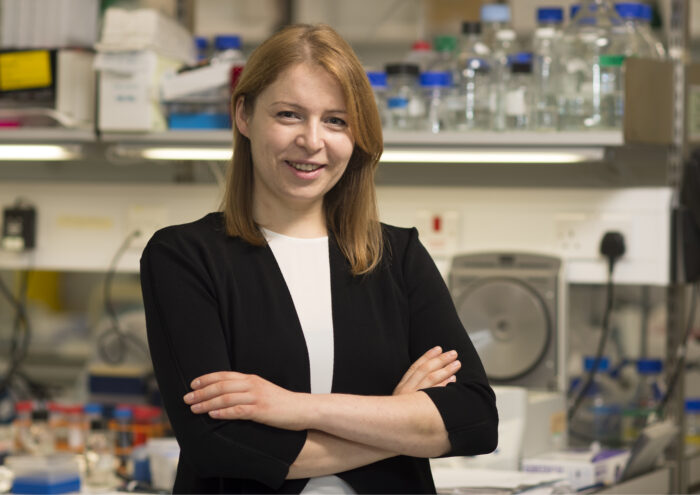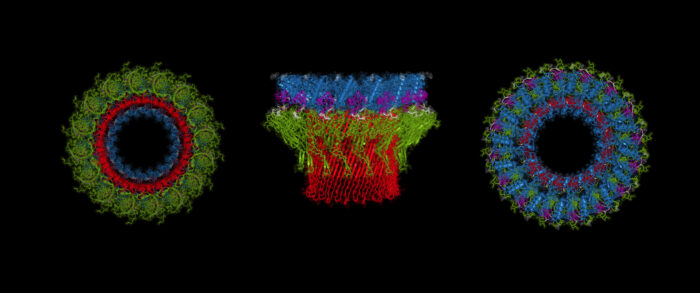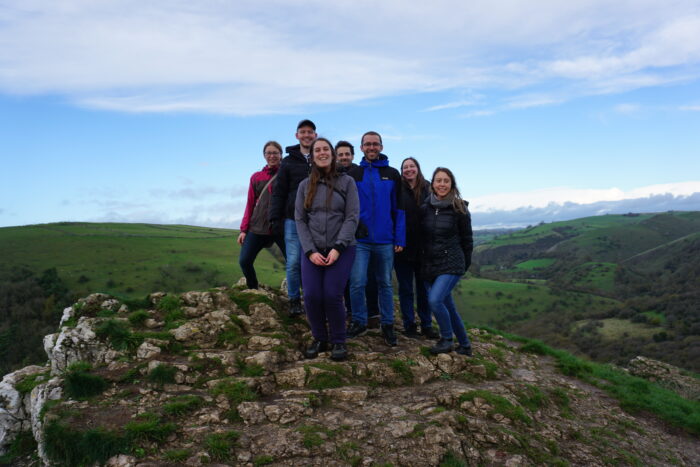From the scientist’s view: a conversation with… Patrycja Kozik

Patrycja Kozik is a Group Leader in the PNAC Division at the LMB.
She received her undergraduate degree from Jacobs University in Bremen, Germany, followed by a Ph.D. at the Cambridge Institute for Medical Research (CIMR), working with LMB alumnae Scottie Robinson. She then received the Sir Henry Wellcome Fellowship, which allowed her to work collaboratively at the Institut Curie in Paris with Sebastian Amigorena, the Broad Institute of MIT and Harvard, USA with Nir Hocohen and at the Cancer Research UK London Research Institute (LRI) (now the Francis Crick Institute) with Caetano Reis e Sousa.
Patrycja came to the LMB in 2016. Here, her group works on dendritic cells – cells which act as ‘sentinels’ of the immune system and activate the immune response when they encounter viruses, bacteria or cancers. Patrycja’s research is focused on furthering a molecular understanding of what happens within dendritic cells to allow them to start the immune response.
We recently talked to Patrycja about her research and career in science. Here are some of the interview highlights, or scroll to the bottom of the page to find the full video.
What is your earliest memory of science or scientific discovery?
I don’t think I grew up thinking about science, as such, a lot. I asked a lot of questions about everything. But I wasn’t really familiar with the scientific culture as such. Maybe it’s not necessarily my earliest memory of discovery, but I remember one of the lectures when I was an undergraduate where we talked about how proteins are transported through the Golgi complex. Our lecturer at the time asked us the question of ‘How do we think it happens?’ At the time, it wasn’t really clear. I got really excited that we were actually learning about something that’s not known. I think it was my first experience of getting to learn something that’s still being investigated, and I got really interested in that. And then I ended up doing an internship on that topic.
And then the reason why I ended up working on vesicle trafficking in the first place, is because in my first year of undergraduate, we had to pick a topic from a hat to write an essay. I picked this topic on vesicles and I was already quite excited about this Golgi complex and trafficking. I was very excited, because the other topics in the hat were about completely different things like bumblebees. Because I actually randomly picked something I really liked, I made an effort writing the essay, and that gave me my first student job in that field.
What is the most exciting thing about your work or research?
Right now, we’re very excited about this pore-forming protein that we have recently discovered. There’s been this question in the field for 30 years probably, of how proteins can escape from endocytic compartments into the cytosol. It’s a pathway that’s unique to dendritic cells (which is a good example of how certain pathways can actually be quite specific to different cell types), and we invested quite a lot of time to develop a new assay in order to study this process. Quite surprisingly, we found this protein, perforin-2, that’s actually very similar to a protein made by T cells in order to kill the target cells. And dendritic cells make a very similar pore-forming protein in order to activate the T cells. We are now trying to understand how dendritic cells control this activity because the T cell pore-forming protein kills, whereas dendritic cells make loads of perforin-2, but actually they survive, so they use it for a very specific pathway. For us, it’s very interesting to try to work out all the details of how this protein actually contributes to the immune response, but also how the cells manage to control this activity.

Has there been a pivotal experiment or moment that really moved your research and understanding forward?
It’s always little steps that move the research forward. We do a lot of genetic screens, which means there’s a long, long, long time when we’re setting the assays up and setting the experiments up. And then you do your screen. Basically, you screen hundreds or thousands of genes, and you try to find the ones that are relevant for your process. So usually that’s the most exciting part of the project, because that’s the biggest step forward. Until then, you don’t really know what you will end up working with. But other than that, every experiment gives you a little bit more information, and usually you move one step forward and then discover even more questions. The research goes much slower than the ‘eureka!’ moment that we often imagine.
What drew you to want to come to LMB and what is special about working here?
We work on the immune system and how immune responses are controlled by dendritic cells. And the LMB is the Laboratory of Molecular Biology, so a lot of the research here is very molecular and very focused on protein structures, cell biology, and much more “detail” than immunology normally is. I really enjoy being here as an immunologist, because it allows us to address the questions we are studying from a very different perspective; you’re forced to think about your question from this molecular side. We can also benefit from all the different assays that have been developed to work on various molecular problems and apply them to this more complex system of immune cells working together. For me, it’s really interesting to be in a somewhat different environment trying to address more immunological questions. Obviously the LMB is an excellent place full of really amazing scientists, so that’s really motivating and inspiring. But also, for the more practical point of view, I really think it makes our science somewhat different by being surrounded by people who think maybe differently than your field generally does.

What key piece of advice would you give to someone embarking on a career in science/research?
I think if you want to do a research career you have to be really excited about the research itself, because a lot of research is difficult, by its nature, right? We’re working with something that we don’t understand how it works. You have to be willing to jump in and just accept the fact that a lot of the time is spent being frustrated by not being able to solve a problem. But I think as long as you’re really excited about the questions you’re trying to address, then it feels it’s worth it. I would say find something that you’re really excited about and then take it from there.
Patrycja was interviewed for the LMB Alumni Newsletter on 29th November 2023